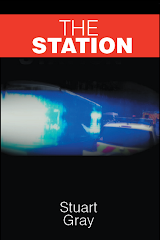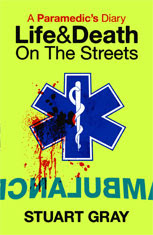Day shift: Three calls; one assisted-only, two by ambulance.
Stats: 1 cardiac arrest; 1 asleep; 1 hypoglycaemic fit.
My morning started out with a call for a 50 year-old man with abdo pain but it turned out to be much, much worse.
The crew was pulling up when I arrived and we all went into the hotel together. There was a panic-stricken look about the staff when we got to the relevant floor and, although we were still going to an abdo pain as far we were concerned, there was something about the look on those faces that said we were wrong. I mentioned to my colleague that the last time I’d had this feeling about a call we found our patient in cardiac arrest. I hadn’t got much further than the room door and the sight of a pair of very white feet on a bed when I heard my name being shouted.
The man was lying on his back on the bed and his wife and a member of hotel security were standing around it. My colleague was preparing the defib and his crew mate joined him immediately. I’d brought my bag up and we all knew what the drill was going to be from that moment on.
The patient was pulled to the floor, shocks were given and we worked on him for a seemingly endless time before another ambulance crew arrived to help us move him. All the time, his wife sat nearby.
‘Are you sure you want to be here?’ I asked her.
‘Yes but if I don’t like anything I’ll look away’, she said.
CPR is a noisy, messy business and the man’s airway needed clearing of vomit a number of times – a few times it had to be done manually and with his body flung to the side because the machine just couldn’t handle it. The hotel room carpet was ruined.
Throughout the procedure the patient was drawing breath. I’d never seen someone in VF continue to breathe like that; it was very strange. I'd seen plenty of agonal breathing but this guy was going and going and at one point his minute-rate was 8 breaths per minute. Intubating him was impossible because he practically coughed the tube out when I attempted it. He’d need to be sedated at hospital, although I would have thought cardiac arrest was a deep enough sleep.
We got him to hospital rapidly but not before almost a dozen shocks were delivered. He came out of VF and into PEA and asystole over and over again – it honestly didn’t look favourable but we kept going all the way to the Resus bed, where the medical team took over. I watched them struggle to keep control of his rhythm too but eventually, after a few more shocks and drugs, he stabilised and, as far as I know, he’s still recovering in ITU.
This particular call taught me a lot and I’ll know how to proceed next time I come across a breathing ‘suspended’ patient. It was also the second cardiac arrest where shocks have been delivered and where something bizarre happened. On another call, the shock resulted in the patient crying out, even though he was in cardiac arrest and later died. It made me stop in my tracks, I can tell you.
It took me ten seconds to wake the ‘unconscious’ man in the doorway up and move him on after I’d been called to this emergency. The office staff didn’t want to touch him, so they called an ambulance. They could have shouted at him – that usually works and it’s free.
Apart from the first call, which used up a lot of hours and energy, there was nothing else happening today. My last call was to a 33 year-old man who’d had a hypoglycaemic fit but the crew was on scene and the man was recovering apparently, so I wasn’t required. One cardiac arrest in a day is quite enough anyway.
Be safe.
Subscribe to:
Post Comments (Atom)















6 comments:
Question:
You say that "The patient was pulled to the floor, shocks were given and we worked on him for a seemingly endless time..."
When I've done first aid training you do CPR then shocks "because you need to take over the function of the heart asap and give the defib time to register the heart rhythem". Do you do that order as an amb. crew? Just wondering, that is all...
I would think they'd use a manual defib, rather than an automatic. We can recognise and deliver a shock much quicker than a machine.
My question is did you have all the necessary gear for an arrest? Generally when I go to an abdo pain I don't take the monitor or the oxygen inside with me.
completely unrelated to the post, i know, BUT i saw an advert on tv yesterday that reminded me of you. there's a new "think" campaign going on to increase awareness of ambulances on the road and encourage good practice when it comes to getting out the way of the emergency services. i had a little chuckle to myself remembering the countless times you've had to put up with selfish drivers. i hope the campaign works!
Kat
CPR was started on the bed and continued on the floor until the defib was ready...but we want to get the shocks in ASAP. Compressions and shocks; that's what it's all about these days.
adam
I cary my bag in regardless when I team up with a crew on calls. They had all the other stuff with them because we generally don't like being caught out.
sarah
It probably won't make much difference. These ads have been running for a long time and drivers still think we are more of a nuisance than a necessity. I'm still getting abuse just for driving with lights and sirens on. Obviously I'm a very inconsiderate person and should proceed to my emergency calls with more stealth. Maybe I should give way more often....
Post a Comment